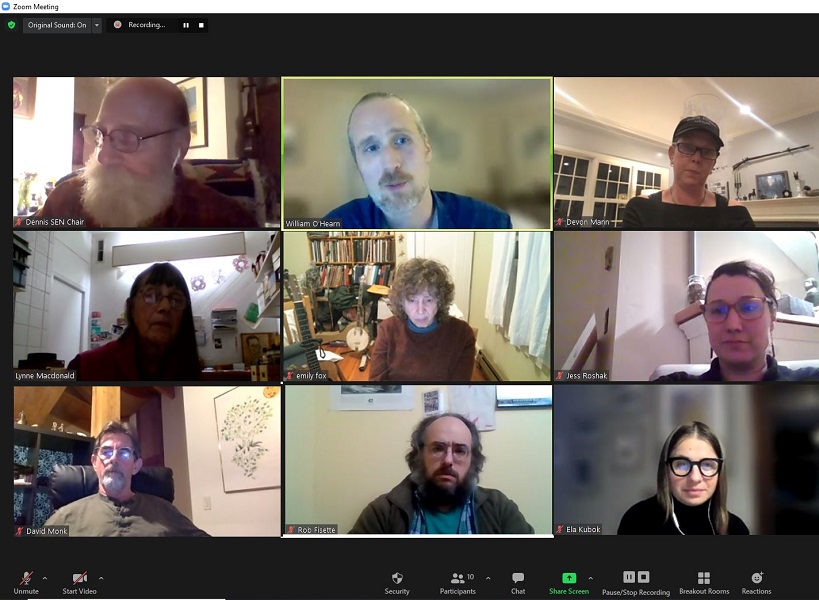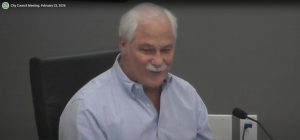Neighbors ask City to fill service gap in 4J library services
8 min read
Library Director Will O'Hearn invited Eugene to participate in a survey coming later this year.
Southeast Neighbors asked Library Director Will O’Hearn for a branch at 40th and Donald.
[00:00:06] SEN Chair Dennis Hebert: I’m going to ask the elephant-in-the-room question here. We have this property at 40th and Donald that we’d love to see a library branch at for South Eugene. What would be the procedure for pursuing something like that?
[00:00:21] John Q: Board member Jess Roshak said a branch would fill a neighborhood gap and help the City meet its climate goals.
[00:00:27] SEN Board Member Jess Roshak: I don’t know how many people know or have kids in the 4J schools, but there’s zero library services going on, at least at the elementary age, there’s no librarians. The libraries are basically left to volunteers that can go in. I know at my kids’ school, there’s no library services at all. They have a space with books, but it’s not managed in any way and it’s a disaster.
Thank you for supporting
local civic journalism
[00:00:49] Transportation-wise, we’ve been thinking about ways to reduce carbon, bring a little bit of library down to Southeast Eugene and just starting with a book drop in the south would be a really big way to help the community. I know when we get our 20 books a week we cart them back all the way over to the library, and from South Eugene, it’s a pretty long way across town.
[00:01:14] Library Director Will O’Hearn: Jess, I just want to say, this is all very provisional, but we were talking about putting some book drops at our community centers, the rec centers like Amazon. Would that feel like it’s close enough or does that feel like it would be too far away?
[00:01:24] Jess Roshak: I think that’s a great idea, ‘cause it’s already community property, we don’t have to worry about private public at that point. We have that voter drop at Amazon on Hilyard. That’s on public transit and would be very easily accessible. I think that would be a good spot. I mean, I would love to see something down in the Safeway 40th and Donald area, because it would be so convenient for people so far south.
[00:01:46] Will O’Hearn: We’re always open to expanding. In fact, we’re trying to be more active about engaging with the community. We’re putting together some community engagement plans, which includes the survey and looking at where are you want to see us expand. And so I would advocate to your city council members. You’re letting me know right now, that’s important to hear. So I would make sure that your voice is heard. Make sure you tell people about it. And we would also participate when we do ask those surveys, which we’re hoping to go out later this year.
[00:02:11] John Q: A suggestion for the Library of Things, from Emily Fox.
[00:02:15] Emily Fox: It’s some gizmo that you can test, whether your dinnerware has lead in it. Maybe three or four years ago, Beyond Toxics had one. And you could bring your dishes there. And it was surprising how many of my dishes had lead. And I have some new dishes I’d love to know if they have lead too. So it’s very common to see lead in dinnerware, in glasses, in bowls. And, it’d be good for the public to have access to this.
[00:02:45] Will O’Hearn: Yikes!. I did not know that. Thank you.
[00:02:47] John Q: Jess asked the library to consider a new service that isn’t available in Eugene – Springfield.
[00:02:52] Jess Roshak: I do dyslexia advocacy. One in five people has dyslexia. It’s a big reason why people wind up in prison. Illiteracy is a really big equity issue in our community and it starts early. We’re graduating 30 percent of our kids who can read at a fifth-grade level. A lot of it’s dyslexia and there’s no services for dyslexia in our community. So I would love to see the library shed a little bit of light on that, given literacy aspects, whether it be for adults or kids, there’s almost zero resources for people.
[00:03:23] John Q: Will O’Hearn also briefed the neighborhood on the library’s resilience during the pandemic.
[00:03:27] Will O’Hearn: We’ve never closed. We’ve offered services to the community during this whole time. Especially during the beginning of the pandemic, there was a lot of misinformation, we always continue to staff our chat line and our phones. We opened for curbside so physical items could be retrieved in June of ’20, and then we fully opened our building on August 24th, 2020 and then we’ve continually thoughtfully brought back services. And then most of our services are available, I’d say about 95 percent. You can browse the collection and do everything you pretty much did before. We have computers open, which are very, very popular and really an important part. Our mantra during this time is, How do we get as much access to the community as possible?
[00:04:02] John Q: Will said the library stopped charging some overdue fines and gave library cards to all students.
[00:04:08] Will O’Hearn: All fined material for youth are fine free regardless of the card holder. You’re not going to be charged on a ‘Goodnight Moon’ or ‘Everybody Poops’ or any of those materials. We made it happen. Our circulation team and our computer services team is amazing. And we are looking at potentially expanding that to our whole collection. So we would be doing away with any overdue fees and fines.
[00:04:26] Anyone that goes to a 4J or Bethel school has a card regardless of the service area, because we wanted to support students. Particularly during that time, it became even more noteworthy to help support students, make sure they had access to our resources regardless of where they live, wanting to be a strategic, thoughtful partner with them because because we want to help early literacy, that’s a big mission of ours.
[00:04:44] John Q: Will said the library has focused on partnerships.
[00:04:47] Will O’Hearn: We’ve worked with Lane County Worksource. They were actually kicked out of their physical space during the beginning of the pandemic, because there were so many unemployment claims and the library was able to provide a physical space, knowing that only about 80 percent of them were able to transition over to a virtual environment. But the most vulnerable, those who did not have the technology or the technological ability to transfer over, were left in the dark. And we’ve helped hundreds of folks be able to search for jobs in partnership with them.
[00:05:12] The Dolly Parton Imagination Library is funded through the Library Foundation, and they partnered with the United Way. if you don’t know about that program, the book is sent to anyone zero to five, so if you know anyone that lives in Lane County with a zero- to five-year-old, make sure they register cause they’ll get a free book every single month. It’s free for the person participating.
[00:05:31] We also partnered with the Museum of Natural Cultural History. We actually started putting together weekly activity kits where basically, here’s a craft, here’s everything you need for it, and you can do it at home. We gave almost 12,000 of them away last year alone. That’s been very successful and we’ve transitioned those, we call it ‘The Fun of the Weekend,’ putting those together every week.
[00:05:47] We helped the NAACP with a supporting one of their book groups. We were looking at putting a book group together to help support BIPOC individuals and found that there was already one out, and helped with providing books and helping co-facilitate that.
[00:05:59] We’ve also implemented a Library of Things program. It’s basically checking out non-traditional items. One of our most popular items, surprisingly enough, is a digital slide converter, which basically digitizes your old slides. Sewing machines, button maker, GoPros like the video cameras. We’re looking at a much larger collection where we’ll add things like baking pans, Cricut maker, even a popcorn machine has been thrown around. We’ve talked to other libraries—the most popular thing is a metal detector. And if you have suggestions, I’d love to hear that.
[00:06:28] We purchased 250 hotspots to circulate to our community. They’re about the size of a deck of cards, a little bit bigger, and they send a Wi-Fi signal and so people can just check them out. And they’ve been very popular. They’ve been checked out at about 97 to 100 percent since we, after the first two weeks. And we’ve taken the other 250 and reserve them for groups that help connect the disconnected—folks that help support, like, the un-sheltered, Downtown Ambassadors. If you have an organization that would benefit from that, let me know, reach out and we can see about hooking you up with that.
[00:06:55] Our seed library is coming up. You can actually check out seeds and we actually do ask you to return. You could harvest the seeds for us and bring them back and bring them onto the next folks. If you don’t, we promise we won’t charge you any overdue fines or anything like that, but it is a way that we can go ahead and we can spread that and make sure everyone has access to gardening.
[00:07:10] And then of course, check out all our electronic resources. That’s e-books, e-audiobooks, comic comics, music. We have two streaming services. Hoopla is really great for audio books, Canopy for movies. We have Ancestry.com, so if you are paying for that, come down to the library, you can use it. The library edition is actually a little bit better. We have LinkedIn learning, and then Brainfuse which it’s a tutoring service online where there’s a live other person on the end. It’s not a library staff member.
[00:07:33] John Q: The library expanded access with new hearing-aid technology, more Spanish-language materials, and a more diverse collection. That’s visible in the statistics.
[00:07:44] Will O’Hearn: 1.1 million checkouts last year, about 110,000 cards in our community. That’s two-thirds of our community has an active library card. And just a couple of weeks ago, we actually got a four-star library award for 2021. It’s kind of like the Oscars of the library, we’re like the top 1% of nationwide excellence for our cost efficiency and service delivery.
[00:08:03] John Q: Watch for surveys so you can provide feedback about the library. Jess Roshak gave some early feedback this week.
[00:08:10] Jess Roshak: Thank you so much. The library has been like a lifesaver. I have two little kids and (whew) thank you. It’s our basically go-to place to go on rainy days and we go there weekly.




